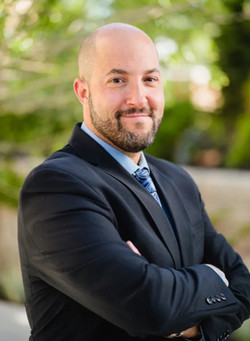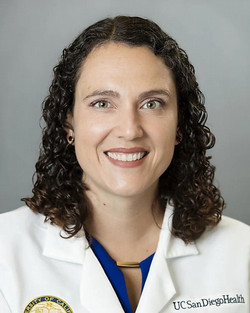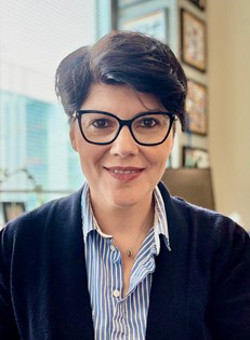Mental Health Awareness Month
May is Mental Health Awareness Month—a time dedicated to increasing understanding of mental health, reducing stigma, and encouraging overall well-being. Each year, the Department of Psychiatry selects a theme to spotlight a key area of mental health. For 2025, the focus is on Addiction.
In recognition of this important theme, we invite you to explore the faculty spotlights below, showcasing the impactful work our Psychiatry faculty are doing in the field of addiction.
 Eric Garland, PhD
Eric Garland, PhD
Dr. Eric Garland is a Full Professor and holds the Sanford Institute for Empathy and Compassion Endowed Professorship. He is the developer of an innovative, evidence-based therapy for addiction, emotion dysregulation, and chronic pain called Mindfulness-Oriented Recovery Enhancement (MORE).
Can you share an overview of your career journey and what led you to specialize in addiction treatment?
In 2006, I set out to develop a mindfulness-based intervention for addiction treatment. At the time, there had been no randomized controlled trials (RCTs) of mindfulness for addictive behavior, though mindfulness was theorized to be able to target the automaticity underpinning addiction. However, clinical insights and neuroscience indicated the need to integrate mindfulness with additional therapeutic techniques, such as reappraisal—the process of cognitively reframing adverse life experiences—and savoring, the process of appreciating and amplifying responses to natural healthy rewards. My psychotherapy practice was the “living laboratory” where I wove these techniques together into the treatment that eventually became Mindfulness-Oriented Recovery Enhancement (MORE). In 2008, I received a Francisco J. Varela Award from the Mind and Life Institute (the award letter was signed by His Holiness the Dalai Lama, one of the founders of Mind and Life) to conduct the first pilot RCT to test MORE in inpatient alcohol use disorder treatment. Early findings suggested MORE might treat addiction by modifying cognitive and psychophysiological mechanisms underpinning drug cue-reactivity. This pilot study launched my nearly two-decade research effort to optimize and establish MORE as an evidence-based therapy.
Although I am intensively engaged in testing MORE’s effectiveness in real world clinical settings, I remain deeply interested in understanding MORE’s therapeutic mechanisms of action, studying its impact on the brain and body through autonomic neuroscience, EEG, and fMRI combined with tasks from cognitive and affective neuroscience. Through this ongoing research program, MORE has emerged as a empirically supported intervention for addiction recovery, an intervention with a strong neuroscientific basis.
Can you tell us about the current research projects or studies being conducted in your lab? What innovative techniques or methodologies are you using in your research?
Mindfulness-Oriented Recovery Enhancement (MORE) was developed and tested in over 16 clinical trials through a $80 million treatment development research program. MORE integrates mindfulness training, “third wave” cognitive-behavioral therapy, and positive psychology into a comprehensive and sequenced mind-body approach. I developed MORE by translating cognitive and affective neuroscience discoveries into a treatment sequence designed to enhance self-awareness, attentional control, emotion regulation, and responsiveness to natural healthy rewards. MORE aims to reduce addictive behavior, emotional distress, and chronic pain while increasing healthy pleasure, meaning in life, and self-transcendence.
In a clinical trial published in JAMA Internal Medicine, we showed
MORE to reduce opioid misuse by 45% at a 9-month following up, nearling tripling the effect of standard group therapy. In another clinical trial published in JAMA Psychiatry,
adding MORE to standard addictions care led to a 42% greater reduction in relapse back to drug use and a 59% greater reduction in treatment dropout than standard addictions care without MORE. MORE also significantly decreases chronic pain, depression, and PTSD symptoms, factors that drive people to relapse back to drug use. After 16 randomized controlled trials involving over 2000 patients, I felt compelled to disseminate MORE. I have trained over 1000 clinicians in MORE and have briefed federal policymakers on this evidence-based therapy, including briefings to the Director of the White House Office of National Drug Control Policy (ONDCP) and the Addiction Treatment and Recovery Caucus of U.S. Congress. I hope to collaborate with state and local policymakers, healthcare administrators, and entrepreneurs to widely disseminate this therapy across the nation.
What are some key findings from your research that have influenced the field?
One of my biggest contributions to science is what I call the Restructuring Reward Hypothesis. Addiction is characterized by reward dysregulation, whereby the brain becomes less sensitive to naturally rewarding objects and events in the social environment, which drives individuals to take higher and higher doses of the drug to preserve a dwindling hedonic equilibrium. The drug becomes the primary source of value, at the expense of non-drug natural rewards. The Restructuring Reward Hypothesis states teaching people to use mindfulness and savoring to shift from valuing drugs back to valuing natural healthy rewards will reduce craving and addictive behavior. And this is in fact what we have found in multiple rigorous neuroscientific studies. For instance, in my new
JAMA Psychiatry paper, we showed using EEG that individuals with opioid use disorder (OUD) exhibited weakened brain responses when attempting to savor positive images, such as smiling babies or beautiful sunsets. This emotional blunting was directly linked to increased opioid cravings. However,
Mindfulness-Oriented Recovery Enhancement (MORE) helped restore the ability to savor, strengthening EEG responses to positive stimuli which led to reduced cravings and improved emotional well-being. Opioid addiction has been termed a "disease of despair" in the epidemiological literature. My research suggests that one antidote to the disease of despair of addiction is to teach people how to mindfully savor natural healthy pleasure, joy, and meaning in life. By reconnecting with positive experiences, individuals can find healthier alternatives to drug use and enhance their emotional resilience.

Carla Marienfeld, MD
Dr. Marienfeld is board-certified in psychiatry, addiction psychiatry, and addiction medicine, and is a HS Clinical Professor who supports recovery in an evidence based, harm-reduction approach through therapy, motivational interviewing, and medication treatment.
Can you share an overview of your career journey and what led you to specialize in addiction treatment?
My career path began with a Bachelor of Arts in Chemistry from Southwestern University. While chemistry provided a strong scientific foundation, I soon realized my deeper interest lay in working directly with people and making a tangible difference in their lives. This led me to pursue medicine, earning my M.D. 2007. My commitment to patient care solidified during my Psychiatry Residency at Yale University School of Medicine (2007-2011), where I also served as Chief Resident. It was during this time, and my subsequent Addiction Psychiatry Fellowship at Yale (2011-2012), that I found my calling. I recognized the profound need for patient advocacy within psychiatry and was particularly drawn to addiction treatment. Seeing the life-changing impact of interventions and being a partner and witness to individuals achieving recovery proved immensely rewarding. This solidified my dedication to specializing in addiction clinically, while slowly gaining research experience and expertise.
What are some of the most rewarding aspects of your work in addiction treatment?
The most rewarding aspect of working in addiction treatment is the profound opportunity to be a partner in and witness to individuals reclaiming their lives. The journey of recovery is often challenging, but the resilience and transformation I observe in my patients are incredibly meaningful. Seeing interventions make a tangible difference and helping people achieve lasting positive change is the cornerstone of my professional satisfaction.
Can you tell us about the current research projects or studies being conducted in your lab? What innovative techniques or methodologies are you using in your research?
My current research centers on developing and evaluating innovative treatments for substance use disorders. I am an investigator in a multi-site clinical trial testing high-dose bupropion XL and long-acting injectable naltrexone for methamphetamine use disorder—a condition with limited effective medication options. Additionally, I serve as a Multiple Principal Investigator (MPI) for the UCSD site of the Healthy Brain and Child Development (HBCD) National Consortium, a landmark study following 7,500 mothers and their children from before birth to age 10 across 24 U.S. sites. This research aims to understand how environmental exposures, including substance use, affect child brain and developmental outcomes. I am also honored to be the new Co-Director of the Pacific Treatment and Research Center (PacTARC), continuing the legacy of Dr. Robert Anthenelli. PacTARC is dedicated to advancing clinical research on the causes of substance dependence and developing effective treatments for alcohol, tobacco, and other drug use disorders.
What are some key findings from your research that have influenced the field?
My research has significantly advanced the understanding of addiction across five key domains.
-
In Addiction Health Services and Large Populations, I have analyzed national datasets from the Veterans’ Health Administration, clinical monitoring data from China, and data from large healthcare systems. This work has revealed the underuse of evidence-based medications for alcohol use disorder and provided insights into methadone use and patient retention in opioid use disorder treatment. Notable studies include analyses of psychiatric services for veterans and the use of long-acting injectable naltrexone in the VA system.
-
In Addiction Health Services and Pregnant Populations, my research has examined the impact of prenatal substance use on maternal and infant outcomes. I’ve identified risks associated with severe maternal morbidity and explored how substance-related diagnoses predict preterm and cesarean deliveries, aiming to improve care for vulnerable pregnant individuals.
-
My work in Addictions and Clinical Treatment focuses on enhancing care quality for individuals with substance use disorders. This includes studies on craving, opioid tapering in cancer survivors, and the role of adverse childhood experiences in overdose risk.
-
In Addiction Education, I’ve developed national courses, workshops, and authored key texts, while also researching effective training models for psychotherapy and pharmacologic treatment.
-
Finally, in Global Mental Health, I’ve contributed to building research training programs in low-resource settings like China and Nigeria, addressing the challenges of adapting evidence-based practices to diverse healthcare environments and advancing global addiction care.
What motivates you to continue your work in addiction treatment and research?
My motivation to continue working in addiction treatment and research stems from witnessing the tangible benefits of these efforts every day. It is profoundly rewarding to see individuals make positive changes and to contribute to a field that can so dramatically improve lives. Taking on the role of Co-Director of PacTARC is a continuation of this commitment, allowing me to further contribute to innovative research and the development of effective treatments that I can apply in my clinical work.
What advice would you give to aspiring addiction specialists or researchers?
Aspiring addiction specialists and researchers should lead with compassion and advocate for patients facing stigma. Gaining experience across diverse settings helps build a deeper understanding of addiction’s complexity. Stay committed to lifelong learning, as the field evolves rapidly. Seek strong mentorship and, as you grow, mentor others. Collaboration across disciplines enhances care and research. Resilience is essential—setbacks are part of the journey, but the rewards of supporting recovery are profound. Finally, contribute to education and training to help expand access to quality care and prepare future professionals. These principles will guide a meaningful and impactful career in addiction.
 Marsida Kallupi, PharmD, PhD
Marsida Kallupi, PharmD, PhD
Dr. Kallupi is an Assistant Professor in the Department of Psychiatry. Her research explores how specific neuronal circuits influence behavior related to drug use and stress by analyzing neuronal activity in addiction-related brain regions through electrophysiology at various stages of drug intake and withdrawal.
Can you share an overview of your career journey and what led you to specialize in addiction treatment?
My career in addiction research began with a pharmacy degree from the University of Camerino in Italy, where I developed a robust foundation in pharmacology and neuroscience. This training sparked a fascination with how drugs alter brain function and behavior, steering me toward addiction—a disorder defined by profound neurobiological disruptions. During my master’s and Ph.D. studies, I investigated key neurotransmitter systems. My master’s research elucidated the role of metabotropic glutamate receptor 5 (mGluR5) in cue-induced drug-seeking behavior, while my Ph.D. research explored Neuropeptide S and its impact on reward and motivation pathways in cocaine, alcohol, and food-seeking behaviors. As a postdoctoral fellow at The Scripps Research Institute, I specialized in ex vivo electrophysiological recordings from neurons in brain regions such as the amygdala and paraventricular nucleus of the thalamus—areas that modulate the interplay between drug-seeking behaviors and stress-induced relapse. This work bridged molecular changes to behavioral outcomes at the synaptic and circuit levels, enriching my multidisciplinary approach. I was drawn to this field by the intellectual challenge of decoding how substances hijack the brain’s reward system and the urgent need to address addiction’s devastating public health impact. Each step—from my early education to my current work—reflects a dual mission: to understand the brain’s complex response to addiction and to, hopefully one day, translate these insights into transformative treatments.
Can you tell us about the current research projects or studies being conducted in your lab? What innovative techniques or methodologies are you using in your research?
In my lab, we investigate the cellular and circuit-level mechanisms underlying drug addiction, focusing on the GABAergic switch—a critical neuroadaptation in which chronic drug exposure disrupts the balance of inhibitory GABAergic signaling in key brain regions. This shift heightens reward circuit excitability, driving compulsive drug-seeking and relapse vulnerability. Our goal is to understand how this dysregulation emerges during and after drug exposure, and to explore experimental therapies that reverse these maladaptive changes and restore healthy brain function.
Currently, we are testing experimental therapies to restore GABAergic balance and reduce addiction-related behaviors, including:
- Neuropeptide-Based Therapies: We investigate neuropeptides for their ability to modulate GABAergic signaling and reduce relapse propensity, targeting pathways that mitigate drug-seeking behaviors.
- Deep Brain Stimulation (DBS): We explore DBS to normalize excitatory-inhibitory balance in real time, offering a potential non-pharmacological intervention for addiction.
- Cannabinoid-Based Approaches: We examine cannabinoid receptor agonists to restore GABAergic function, leveraging their modulatory effects on synaptic transmission to counteract addiction-related changes.
To address these questions, we employ:
-
Behavioral Operant Procedures: These include intravenous self-administration and vapor exposure paradigms to model drug intake in rodents, replicating addiction-like behaviors.
-
Ex Vivo Electrophysiology: We perform electrophysiological recordings to assess neurotransmitter synaptic activity and neuronal excitability in brain slices from addiction models, revealing cellular-level changes.
What are some key findings from your research that have influenced the field?
Two key projects from my research have significantly influenced addiction science by introducing novel therapeutic strategies for opioid and nicotine dependence.
In the first project, published in Proceedings of the National Academy of Sciences (PNAS) and Neuropsychopharmacology, we demonstrated that the neuropeptide nociceptin attenuates compulsive oxycodone self-administration in rats by normalizing GABAergic transmission in the central nucleus of the amygdala (CeA). Additionally, we showed that genetic deletion of the nociceptin/orphanin FQ (NOP) receptor confers resilience to addiction development. These findings highlight the NOP system as a promising target for opioid use disorder (OUD) treatments. Specifically, NOP agonists could offer non-addictive alternatives to traditional opioids—minimizing risks like abuse liability and respiratory depression—while NOP antagonists may prevent addiction vulnerability, paving the way for personalized medicine approaches. By using outbred heterogeneous stock rats to capture individual differences in addiction-like behaviors, our work enhances the translational relevance of preclinical models, aligning with human population variability. This research has spurred advancements in developing NOP receptor agonists and antagonists for addiction, pain, and stress-related disorders.
In the second project, published in Science Advances and Chemical Communications, we developed an enzymatic approach to combat nicotine dependence using NicA2, a nicotine-degrading enzyme from Pseudomonas putida. This enzyme reduces nicotine levels in the blood and brain, reversing dependence, decreasing compulsive-like intake, and preventing relapse in rodent models. Unlike traditional pharmacotherapies that target brain reward or stress systems, this peripheral strategy neutralizes nicotine before it reaches the brain, avoiding side effects associated with drugs like varenicline or bupropion. Our use of extended-access nicotine self-administration models establishes a robust preclinical framework for testing enzymatic therapies, inspiring further research into biologics for nicotine and other substance use disorders.
Together, these projects have reshaped addiction treatment paradigms by introducing innovative molecular and enzymatic strategies, with potential applications across multiple substance use disorders.
 Eric Garland, PhD
Eric Garland, PhD
 Marsida Kallupi, PharmD, PhD
Marsida Kallupi, PharmD, PhD